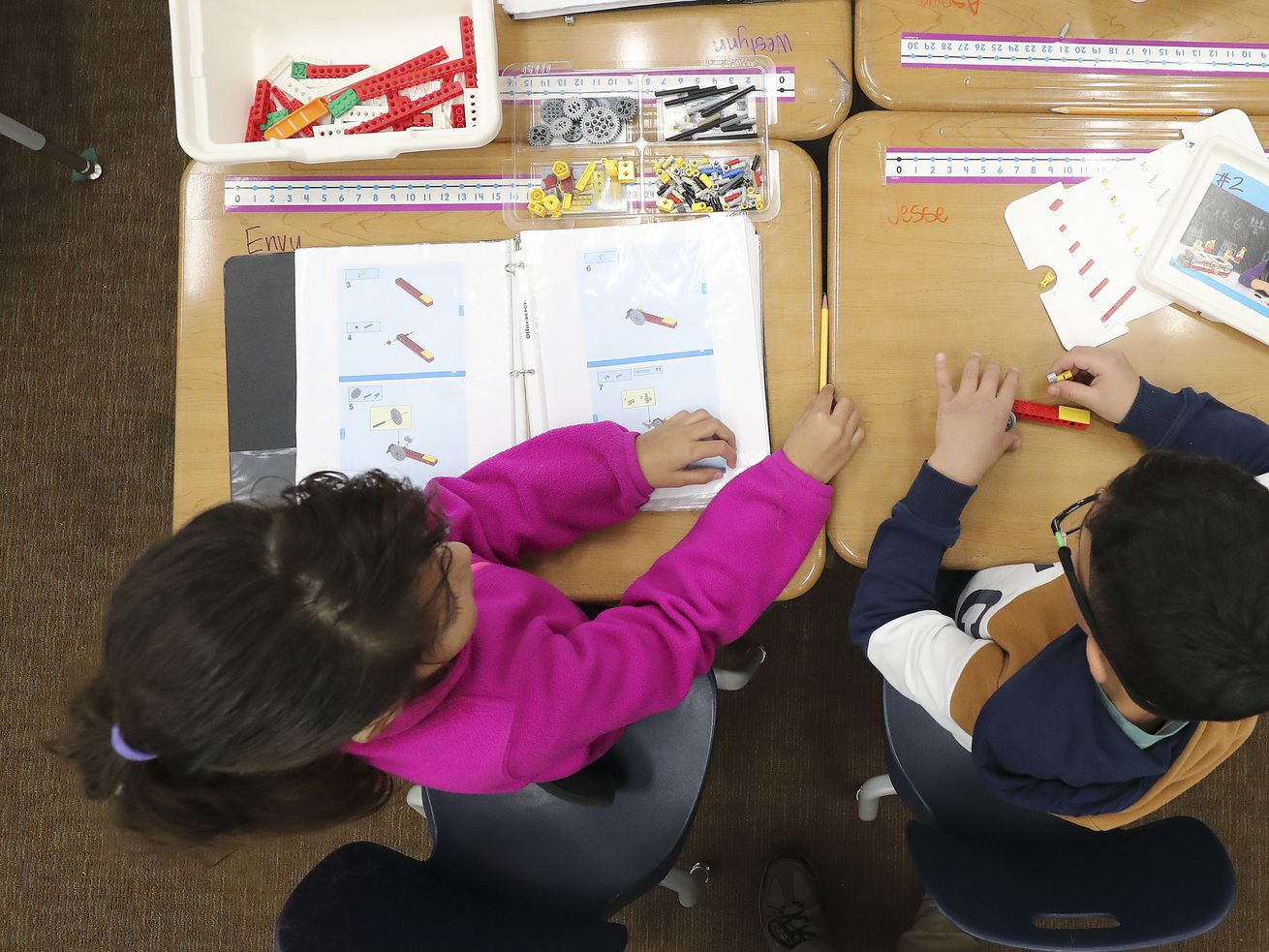 Midvale Elementary School students Ashley and Omar work on a STEM Lego engineering activity at the Midvale school on Wednesday, Dec. 18, 2019. | Jeffrey D. Allred, Deseret News
Midvale Elementary School students Ashley and Omar work on a STEM Lego engineering activity at the Midvale school on Wednesday, Dec. 18, 2019. | Jeffrey D. Allred, Deseret News
The Utah Legislature is currently engaged in what the Utah Citizens’ Counsel believes are shortsighted budget cut discussions, including 2-10% cuts in its 2020-2021 base budget and repeal of all new money appropriated at the end of its 2020 legislative session. Such action, resulting from the COVID-19 pandemic and anticipated state revenue losses, is premature and ill-advised because the projections of revenue losses are overly pessimistic, outdated, with unreliable ranges; bonding now being undertaken to fund prison construction overruns and road construction will free up hundreds of millions in cash reserves to reduce budget cut needs; and Utah has more than enough revenue in its rainy day reserves (over $5.4 billion, including over $500 million in the Education Reserve Fund alone) to mitigate the impact of the current economic downturn and needs to spend only a portion of those funds, saving the balance for future economic uncertainties.
If targeted budget cuts still are thought necessary, the Legislature would, as the saying goes, be penny wise and pound foolish to cut newly appropriated monies that address priority needs in education and human services, two areas chronically underfunded.
For instance, it is folly to repeal the new, modest $3 million appropriation for preschool and the $10 million for optional extended-day kindergarten, investments that pay for themselves over time as they help Utah’s at-risk children keep up with their less-at-risk peers. Closing this achievement gap is an urgent and continuing need. Postponing progress will be a mistake, as mounting research results demonstrate how much difference kindergarten readiness can make to the long-term achievement, health and employability of at-risk children. The same basic argument, with brain research support, applies to the value of strengthening early intervention services, quality child care and toxic stress reduction in infants and toddlers.
Furthermore, eliminating significant and sorely needed new money for public school programs erases the basis for the compromise required to gain educators’ support for a constitutional amendment on the ballot this November. The amendment would allow part of Utah’s state income tax revenue to be diverted to noneducational needs of children and persons with disabilities. The new money appropriated was never guaranteed to continue past the coming year, and any elimination now indicates bad faith on the part of the Legislature. It should withdraw the amendment.
Additionally, more, not less, funding is needed to reopen schools successfully. New research indicates students on average are falling months behind because of virus disruptions and online schooling. Disparities in access to remote learning fall most heavily on Utah’s racial and ethnic minorities. More assessment measures and more paraprofessionals will be needed to identify and meet neglected and unanticipated individual student needs. Moreover, teachers may need specific training to strengthen their remote instruction repertoire and meet new in-person demands in these uncertain times. Then, too, funding is needed for more emotional, behavioral and health support from therapists, counselors and nurses— already in very short supply.
Simultaneously, reopening schools is likely to require increased administrative costs to accommodate CDC, state and local school district pandemic guidelines: for instance, fewer students in each classroom, more school buses so children can sit in alternate rows and limited sharing of supplies such as markers, art supplies and electronic equipment. More janitorial services will be needed to disinfect classrooms, bathrooms and water fountains, along with personal protective equipment and thermometers for daily classroom health checks.
Utah teachers and administrators work hard to educate and meet the needs of their students — the future generation. It took almost a decade for state funding to return to pre-2008 Great Recession levels. We cannot afford to lose another decade before returning to pre-pandemic levels. Fortunately, we have ample budget reserves awaiting legislative use.
Dixie Huefner is a retired professor of special education at the University of Utah. Julie Miller is retired principal in the SLC School District. Robert Bullough is a retired professor of teacher education at Brigham Young University. The Utah Citizen’s Counsel by is an independent, non-partisan group of senior community advocates dedicated to improving public policy on complex issues.

